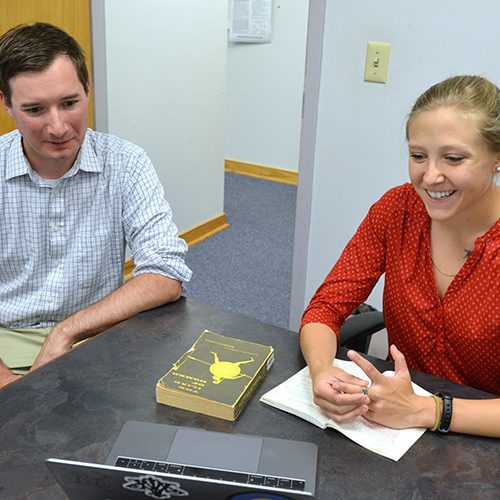SURI Project Explores Ancient and Modern Perspectives on War

Maj. Steve Knepper and Cadet Krystal Graves ’20 discuss her summer research project on “The Iliad.” VMI photo by Mary Price.

Maj. Steve Knepper and Cadet Krystal Graves ’20 discuss her summer research project on “The Iliad.” VMI photo by Mary Price.
This summer, Cadet Krystal Graves ’20 studied the ancient past with the goal of learning more about modern attitudes toward war and the morality of war.
Graves examined “The Iliad,” an ancient Greek epic poem about the Trojan War, in conjunction with the writings of Simone Weil and Rachel Bespaloff, two Jewish women writing on the eve of World War II. In 1939, both women published essays about “The Iliad” and its lessons for 20th century humanity.
Spurred by an interest she’d developed while studying in Greece during the spring 2018 semester, Graves had hoped to write about “The Iliad” for her summer project, which is being conducted under the auspices of the Summer Undergraduate Research Institute.
However, when she approached Maj. Steven Knepper, assistant professor of English, rhetoric and humanistic studies, with that idea, he suggested that she narrow her topic considerably. It was Knepper who introduced Graves to “War and the Iliad,” a 2005 book that brought the essays of Weil and Bespaloff together in one volume for the first time ever.
“When I was reading it, I discovered that they’re almost in conversation with each other,” said Graves. “They’re both writing on a very similar topic at a similar time, right before World War II.”
Incredibly, Graves and Knepper both noted, the two women did not know they were both writing about “The Iliad.” By coincidence alone, they were inspired to write on the same topic at roughly the same time.
For me, it was interesting because Weil and Bespaloff are two Jewish women writing in the context of World War II as they escape Paris and, eventually, Europe. They are living through the greatest conflict in the history of the world. And so, the fact they’re both philosophers who choose to study [messages from ‘The Iliad’] about war and the human condition, at the same time and in such a unique context, was really intriguing.”
For Graves, the study of warfare and humanity’s responses to being surrounded by war are far from a purely academic interest. After growing up in Ruidoso, New Mexico, and graduating from New Mexico Military Institute – a school that has counted many VMI alumni among its superintendents – Graves came to VMI for Marine Corps ROTC.
As she prepares to commission, Graves finds the writings of those who’ve seen a world at war speaking to her.
“There’s this continued modern significance of something that’s over 2,500 years old, and there’s these two French philosophers who are able to say things about ‘The Iliad’ that resonate with me, who’s a 21-year-old college student going into the Marine Corps,” she stated. “The common thread is ‘The Iliad’ through all of it.”
Graves explained that while Weil focuses on the concept of force, referring to “The Iliad” as “a poem of force,” Bespaloff focuses on resistance to that force.
“The Trojan prince, Hector, is a key figure for a resistance hero in the sense of this force that’s acting on him in the form of the Greeks,” she stated. “He understands that he’s fated to die and that his city is going to be destroyed, but he still chooses to fight against that, his fears and to resist that force that’s imposing on him.”
Set against the backdrop of World War II, the writings of the two women can be seen as a commentary on current events.
“Weil’s essay is a classic study,” said Knepper. “Since she sort of flattens war into force, though, it makes it hard to judge just and unjust conflict. Bespaloff, with her resistance hero, has French resistance to the Nazis in mind. During the war, Weil would actually revise her earlier pacifism and begin working for de Gaulle’s Free France.”
Graves hopes that her summer work will inform her honors thesis, which she plans to write on how we as a modern society lack a complete definition of honor. She explained that she’ll be working with Dr. Duncan Richter, professor of English, rhetoric and humanistic studies, to explore how the word “honor” has been used since ancient times, but its meaning has changed over the centuries.
Graves came to VMI as a biology major, but switched to English as she felt it would help her understand people better and thus be a better Marine Corps officer. As she explores both ancient and modern conflict, and human responses to that conflict, she’s come to an interesting conclusion.
“The conclusion I’d like to come to in this paper … is that we as a human race should have outgrown war by now, but we haven’t,” she stated.
“What I’ve learned at VMI, and from doing projects like this specifically is … how we as war-fighters understand the most moral and ethical route you can take, and also that conflict should be transient,” Graves continued. “It shouldn’t be something I aspire to do for my entire life, and that’s the VMI ideal of the citizen soldier.”